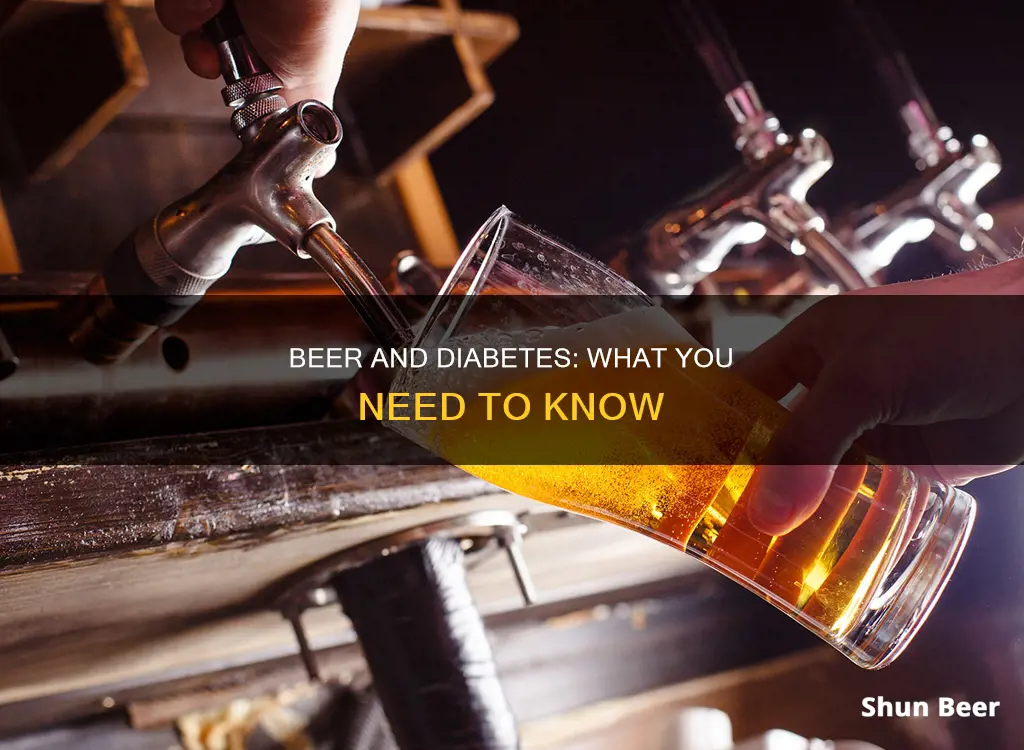
Beer is a popular alcoholic beverage, but what does drinking it do to a person with diabetes? Beer is a significant source of carbohydrates, so it can impact blood sugar levels. Depending on the type, it can also be high in calories, which may contribute to weight gain over time. Beer can also be high in alcohol content, and because the liver prioritises clearing alcohol from the body, drinking it can slow down carb metabolism, potentially leading to low blood sugar (hypoglycemia). This effect is especially likely when drinking on an empty stomach.
| Characteristics | Values |
|---|---|
| Effect on blood sugar levels | Beer can cause blood sugar to drop very low (below 70 mg/dL) or spike and then fall quickly, potentially causing hypoglycemia. |
| Calories | Beer is high in calories and can contribute to weight gain over time. |
| Alcohol by volume | Beers contain 2-12% ABV. Lower ABV beers have closer to 6 grams of carbs, while higher ABV beers may have 20-30 grams per 12-ounce bottle. |
| Carbohydrates | Beer is a significant source of carbohydrates, with an average of 13 grams of carbohydrates per 12-ounce can. |
| Vitamins and minerals | Beer contains small amounts of B vitamins, calcium, magnesium, and phosphorus. |
| Safe consumption | It is recommended that women have no more than one drink per day, and men have up to two drinks per day. One drink is considered to be 12 ounces. |
| Best consumed with | It is recommended to consume beer with food, especially sources of carbohydrates and protein, to slow down the absorption of alcohol and prevent blood sugar spikes and drops. |
What You'll Learn
- Beer is a source of carbohydrates and can impact blood sugar levels
- Drinking beer may contribute to weight gain over time
- Drinking beer can slow down carb metabolism, potentially leading to low blood sugar
- Drinking beer can affect your body's ability to regulate blood sugar
- Drinking beer can increase your risk of developing diabetes

Beer is a source of carbohydrates and can impact blood sugar levels
The impact of beer on blood sugar levels is twofold. On the one hand, beer can increase blood glucose levels due to the presence of carbohydrates. On the other hand, excessive alcohol consumption can lead to hypoglycemia or low blood glucose levels. This is because alcohol interferes with the liver's ability to release stored glucose into the bloodstream, disrupting the body's ability to regulate blood sugar effectively. Additionally, drinking alcohol can affect the hormones that regulate blood sugar levels, decreasing insulin sensitivity.
For people with diabetes, the impact of beer on blood sugar levels is particularly important to consider. Diabetes is a condition where the body struggles to regulate blood glucose levels, and alcohol can exacerbate this. Drinking beer can increase the risk of hypoglycemia for those with type 1 diabetes and those with type 2 diabetes using insulin. The symptoms of low blood glucose levels can include fatigue, sweating, an irregular heartbeat, confusion, abnormal behavior, blurred vision, seizures, and even loss of consciousness. Therefore, it is crucial for people with diabetes to monitor their blood sugar levels and drink in moderation if they choose to consume beer.
It is worth noting that the effects of alcohol on blood sugar levels can vary from person to person. It is always a good idea to consult a healthcare professional for personalized advice and to be aware of the symptoms of hypoglycemia. Additionally, drinking in moderation, consuming alcohol with food, and staying hydrated by drinking water along with beer can help mitigate some of the negative impacts on blood sugar levels.
Black Beer Enthusiasts: Their Favorite Brews
You may want to see also

Drinking beer may contribute to weight gain over time
Beer is a staple beverage for many, but it is important to be aware of its potential impact on weight gain. Beer is a significant source of carbohydrates and can be high in calories, depending on the type. Excessive alcohol consumption, including beer, can lead to weight gain over time. Here are some key points to consider:
Calories and Carbohydrates
Beer contains a substantial amount of calories and carbohydrates, which can contribute to weight gain. A 12-ounce can of beer typically contains 13 grams of carbohydrates and around 100-150 calories. The high calorie content, without providing essential nutrients, can lead to an excess energy intake, promoting a positive energy balance and, ultimately, weight gain.
Alcohol's Impact on Fat Metabolism
Alcohol interferes with the body's ability to burn fat. When you consume alcohol, your liver prioritizes breaking down alcohol instead of fat. As a result, your body accumulates fat, especially around the abdominal region, leading to what is commonly known as a "beer belly." This abdominal fat is associated with several health complications.
Appetite and Hormonal Effects
Alcohol can affect the hormones that control appetite, hunger, and stress. It can increase your appetite and cravings for salty and greasy foods, leading to unhealthy food choices and excess calorie intake. Additionally, alcohol may impair the function of glands that release hormones, causing weight gain. For example, elevated cortisol levels, often associated with heavy drinking, can increase abdominal weight gain and cravings for high-calorie foods.
Individual Factors
The relationship between alcohol consumption and weight gain varies among individuals. Factors such as gender, drinking patterns (frequency, amount, and type of alcohol), physical activity level, sleeping habits, and genetic predispositions all play a role in how alcohol affects weight. For instance, men tend to consume more alcohol and are more likely to drink beer, which contributes to abdominal adiposity.
Recommendations
While moderate alcohol consumption may not cause weight gain, heavy drinking and binge drinking are more consistently linked to weight gain over time. To maintain a healthy weight, it is essential to drink in moderation, combine alcohol consumption with physical activity, and make healthy food choices when drinking.
Kids and Non-Alcoholic Beer: Is It Safe?
You may want to see also

Drinking beer can slow down carb metabolism, potentially leading to low blood sugar
The effect of alcohol on the liver can cause a drop in blood sugar levels, known as hypoglycemia. This is a particular concern for people with diabetes, as they may already have trouble getting sugar into their bloodstream. Hypoglycemia can cause symptoms such as dizziness, lightheadedness, and even loss of consciousness in more extreme cases. It is important to note that the symptoms of hypoglycemia can be similar to those of being drunk, so it is easy to confuse the two. Therefore, it is crucial to monitor blood sugar levels before, during, and after drinking, and even up to 24 hours after drinking, as hypoglycemia can strike hours after the last drink.
To minimize the risk of low blood sugar when drinking beer, it is recommended to drink in moderation and only when blood sugar levels are well-managed. It is also advisable to drink with food, especially including some carbohydrates, as this can help slow the absorption of alcohol and provide better protection against low blood sugar. Additionally, staying within recommended serving sizes and choosing lower-carb beers can help keep blood sugar levels in check.
If you have diabetes and want to drink beer, it is important to be mindful of how it can affect your body and how to manage it safely. Consulting with a healthcare professional can provide specific guidance on drinking safely with diabetes, including any necessary adjustments to medication or insulin dosages.
Steroid Shots and Non-Alcoholic Beer: Safe Mix?
You may want to see also

Drinking beer can affect your body's ability to regulate blood sugar
When you consume beer, the carbohydrates in it can cause a spike in blood sugar levels, followed by a quick drop. Additionally, alcohol interferes with the body's ability to regulate blood sugar. Normally, the liver stores and releases glucose (sugar) into the bloodstream to maintain healthy blood sugar levels. However, when you drink alcohol, the liver prioritizes breaking down and eliminating alcohol from the body, which can delay the release of glucose. This interruption in blood sugar regulation can lead to hypoglycemia, or low blood sugar.
The risk of hypoglycemia is higher when drinking on an empty stomach or consuming excessive amounts of alcohol. It is recommended to drink beer with food, especially sources of carbohydrates, to help slow down the absorption of alcohol and maintain stable blood sugar levels. Additionally, drinking in moderation and monitoring blood sugar levels before, during, and after drinking are important to manage blood sugar effectively.
The effects of beer on blood sugar can vary depending on individual factors, such as medication use and other health conditions. For those taking insulin or insulin-stimulating medications, drinking alcohol may require dosage adjustments. It is crucial to consult a healthcare provider to determine how to manage medication and alcohol consumption safely.
Mixing Mucinex and Beer: Is It Safe?
You may want to see also

Drinking beer can increase your risk of developing diabetes
Beer is a significant source of carbohydrates, which can impact blood sugar levels. It can also be high in calories, which may contribute to weight gain over time. Excess weight is a risk factor for type 2 diabetes. Additionally, drinking alcohol can slow down carb metabolism, as the liver prioritizes clearing alcohol from the body, potentially leading to low blood sugar (hypoglycemia). This effect is exacerbated when drinking alcohol with diabetes medications.
Drinking beer can also increase your risk of developing diabetes by contributing to conditions that cause the disease. Regular heavy drinking can reduce the body's sensitivity to insulin, which can trigger type 2 diabetes. Diabetes is also a common side effect of chronic pancreatitis, which may be caused by heavy drinking. Alcoholic drinks are often high in calories, which can lead to weight gain and increase the risk of type 2 diabetes.
The effects of drinking beer on blood sugar levels are particularly relevant for people with diabetes. Drinking beer can interfere with blood sugar levels, making it more likely for them to experience a hypo. Additionally, drinking on an empty stomach further increases the risk of hypoglycemia. It is important for people with diabetes to be aware of how alcohol affects their bodies and to manage their drinking accordingly.
Overall, drinking beer can increase your risk of developing diabetes, especially if consumed in excess. It is important to stay within the recommended guidelines for alcohol consumption to minimize this risk.
Mare of Easttown: Beer Choices of the Characters
You may want to see also
Frequently asked questions
Yes, people with diabetes can still drink beer, but they need to be cautious and aware of how it can affect their body and how to manage this. It is recommended to drink in moderation and only when diabetes and blood sugar levels are well managed.
Drinking beer can interfere with diabetes medication and impact blood sugar levels. It can cause blood glucose levels to rise or fall, depending on how much you drink and whether you have eaten. Beer can also be high in carbohydrates and calories, which can lead to weight gain.
Alcohol consumption recommendations for people with diabetes are the same as for the general population: no more than one drink per day for women and up to two drinks per day for men. It is important to drink slowly, pace yourself, and not drink on an empty stomach.
"Light" beers tend to be lower in carbohydrates, calories, and alcohol content, so they may be a better option for people with diabetes. Craft beers like IPAs and stouts tend to be higher in carbs and calories, so it's best to stick to just one serving.







